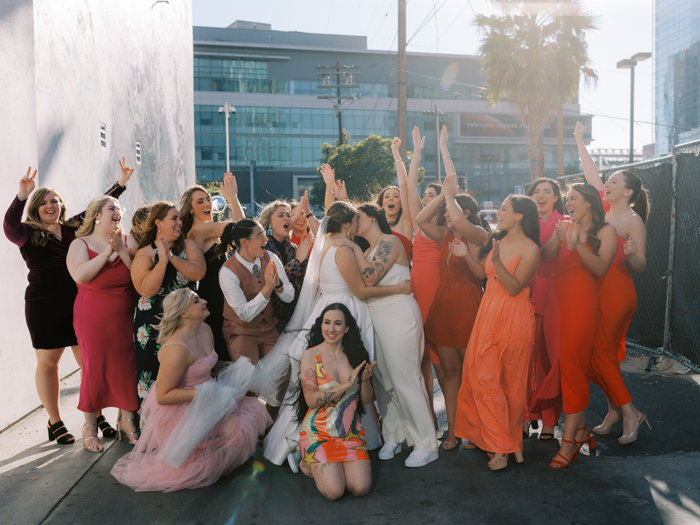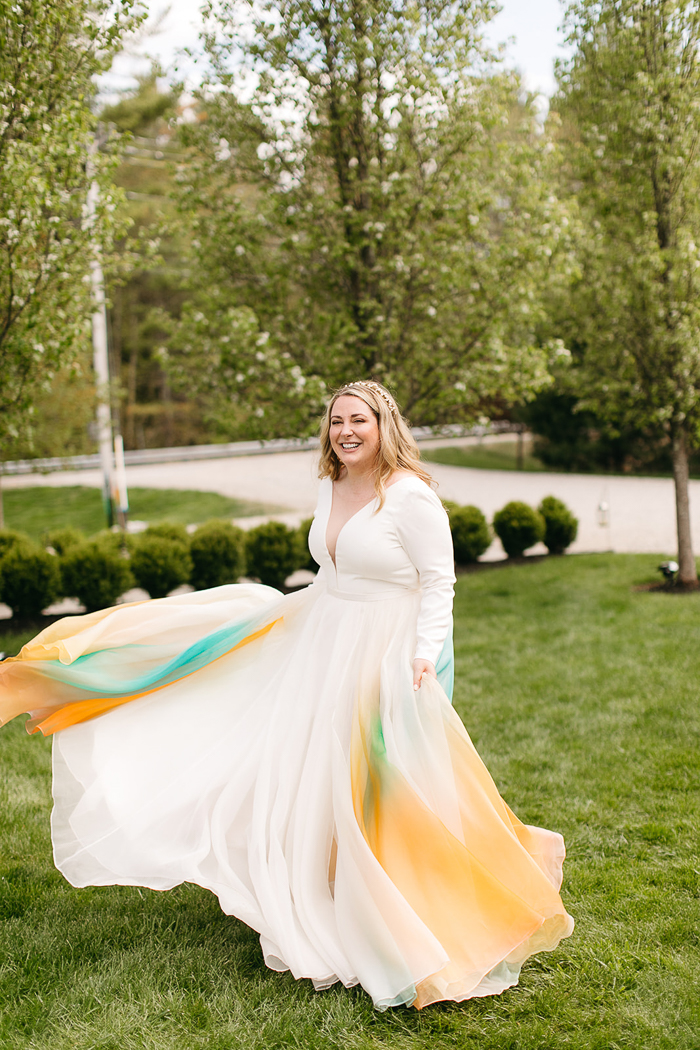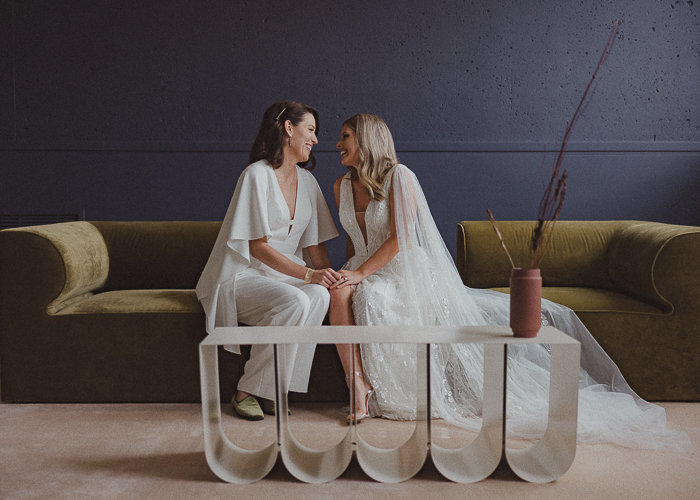
Image by Apollo Fotografie
Planning a wedding is an exciting and personal journey, allowing couples to express their unique love story and values. As we progress as a society, more and more couples are opting to ditch tradition and celebrate equality when tying the knot. We know that this can be daunting, though. Where do you even begin? What aspects of weddings are rooted in patriarchy in the first place?
If you want a feminist wedding that celebrates you and your partner as equals, look no further. We’re breaking down the steps you can take and what to leave out to ensure that your day supports women’s rights as much as possible.
How to Have A Feminist Wedding
Get Both Parents Blessing
Once it comes time to get engaged, you may find yourself uncomfortable with your fiancee asking your father for permission. Women aren’t property, and you shouldn’t be treated as such. If you’re old enough to be getting married, you’re probably old enough to make your own decisions–whether your parents agree or not.
However, if this is a tradition that your fiancee isn’t willing to give up, consider having them ask your parents as well as their own. This implies that they respect all opinions and see it more as a blessing of the marriage than a dad passing his daughter off to someone else.
Start with Open Communication
Begin the wedding planning process by having open and honest conversations with your partner about what feminism means to both of you and how you want to incorporate these values into your wedding. If you’re getting married, there’s a good chance you’ve already had these conversations in some way, shape, or form–but you may not have thought about applying them to your big day. It’s important to listen to and try to understand each other’s perspectives, values, and expectations to ensure you’re on the same page.
Challenge Traditional Roles
Feminist weddings often challenge traditional gender roles. Consider how you want to present yourselves beyond the customary bride-groom dichotomy. Some ideas include:
- Attire – Wear whatever makes you feel comfortable and confident. This might include unconventional attire, such as a suit or jumpsuit instead of a wedding gown (or vice versa), or opting for something colorful
- Wedding party – Long gone are the days where you have to choose your wedding party based on their gender. Choose friends and family based on their significance in your lives–whether this means having a bridesman or a groomswoman. Let your wedding party be a reflection of those closest to you
- Getting ready together – While this one is more superstition than anything, if you want to stay the night with your significant other and/or get ready with them the morning of, do it. It can be a great way to settle nerves
- Walking down the aisle – If you don’t want your father to walk you down the aisle, consider walking together with your fiancee, your mother, both of your parents, or someone else significant in your life
- No bouquet or garter toss – These are some of the easiest traditions to nix when planning a feminist wedding. Your single friends may never want to get married (or at the very least don’t want to be called out in front of everyone), and your significant other biting the garter down your leg can be uncomfortable for you and your family. There are plenty of other entertainment options for your reception that your guests will find far more interesting
- Joint bachelor/bachelorette party – When you and your significant other are best friends, you become close with their friends. So why not have a joint bachelor and bachelorette party so you can celebrate with everyone you love?

Image by Henry and Mac
Pay For the Wedding Yourselves
In the past, the bride’s family was expected to pay for the wedding–almost like a modern dowry, if you will. Not only is this thought process unfair to the bride’s parents, but it’s also outdated. According to Zola, the average couple spends about $29,000 on their big day. That’s no small ask for anyone. Allowing both sets of parents to contribute or paying for it yourself not only adds a feminist touch to your day, but it also gives you more control.
Inclusive Language in Your Ceremony
Your wedding ceremony is the perfect opportunity to promote feminist values. Work with your officiant to craft a ceremony that uses inclusive language and emphasizes equality. You might also want to include readings, quotes, or rituals that highlight the importance of mutual respect and partnership.
The same goes for your vows. Highlight your commitment to supporting each other’s dreams, aspirations, and personal goals. You two are a team, and making this clear in your written words is a small yet simple way to showcase your equality.
Vendor Selection
Your feminist wedding doesn’t have to stop at what traditions you do and do not uphold. It can also apply to your vendor selection. Support businesses and vendors that align with your values. Look for inclusive and diverse vendors who understand and respect your vision–those committed to equal treatment and representation.

Image by Nathan Rivers Chesky
Gifts and Registries
Consider a registry that supports gender equality and social justice causes. This could be by including women-owned brands or encouraging your guests to donate to feminist organizations in lieu of traditional gifts, helping to create a positive impact beyond your wedding day.
Encourage Speeches
Traditionally, women were not handed the microphone to make speeches. Luckily, that old-fashioned mindset is quickly disappearing, but if you want to ensure everyone gets to speak, encourage your bridesmaids to give a speech or toast. The same goes for you as the bride as well. If you want to say a word of thanks to your guests, don’t be afraid to grab that mic. Not into speeches at all? Then don’t have them! That’s the best part about it being your wedding–you get to do what you want.
Changing Your Last Name
A feminist wedding isn’t just about the big day–it continues after, too. More people all over the world are choosing to forgo their significant other’s last name, keeping their maiden name. You may choose to do this for countless reasons, but there’s no denying that it makes life easier. You don’t have to spend hours getting all the necessary paperwork ready to legally change it.
If you decide to keep your maiden name, it’s important to have this conversation with your significant other early on. If this is something important to you, hopefully they understand. If they’re uncomfortable with the idea, it may be wise to have a deeper conversation.
Remember, your wedding day is an expression of your beliefs, and it has the potential to inspire others to consider the values that matter most to them. If you’re ready to host a feminist wedding, these steps are just the beginning. Here are seven ways to have an anti-bride wedding that will help you create a wedding tailored to you.

Image by Maggie Grace Photography















.jpg)



